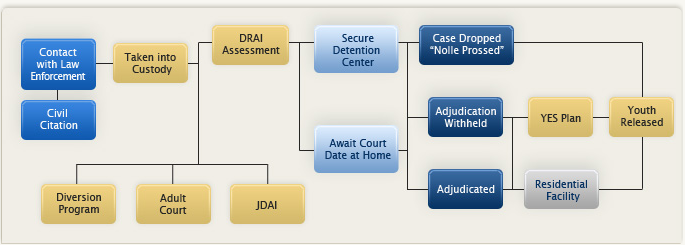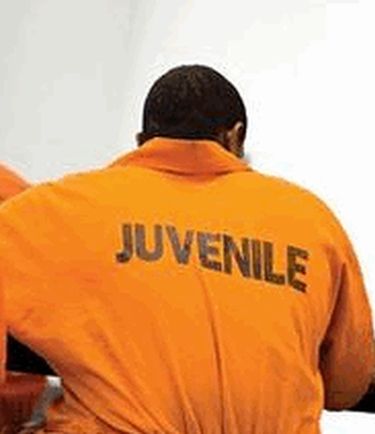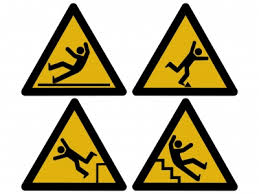Juvenile Offenses
Juvenile Court and Adult Court Differences
The circuit courts in Florida have jurisdiction over all cases in which a child is alleged to have committed a delinquent act or violation of law. A violation of the law is alleged through a delinquent complaint filed by a law enforcement officer when a juvenile in Florida is alleged to have committed a felony, misdemeanor, contempt of court or violation of a local ordinance.
A juvenile does not have all of the same protections that an adult has to defend himself against a false accusation. Most notably, there are no jury trials in juvenile court under Florida law. If the case goes to trial, the juvenile court judge will determine your child's guilt or innocence.

Arrest, Release and Detention
Once the juvenile has been arrested for violation of a criminal law, the child will be taken to the Juvenile Assessment Center (JAC) where the JAC will determine whether further detention is necessary.
After a child is arrested and detained, he or she is taken to a juvenile detention center in the county in which the offense allegedly occurred. During the intake process, the JAC staff will contact the juvenile's parents.
In many cases, especially for misdemeanor or third-degree felony offenses, the releasing officer with the Department of Juvenile Justice (DJJ) counselor will issue the child a "Juvenile Notice to Appear" that directs the parent, adult relative, legal guardian or other responsible adult to take custody of the child and promise to ensure that the child appears at the designated time for the arraignment.
Alternatively, after the juvenile is admitted to the Florida juvenile detention center, the juvenile will be taken before the juvenile court within 24 hours for a detention hearing. An experienced Orlando juvenile criminal defense attorney can represent your child at the detention hearing to provide him or her with the best chance of being released while the case is pending.
Florida juvenile detention facilities are designed as a temporary program to house the juvenile prior to the resolution of the juvenile's court case. If the juvenile is found guilty, the child can be sentenced to a long-term residential program or a non-residential program as discussed below.
Detention Hearing
If the juvenile is held in detention, a detention hearing must be held within 24 hours of the arrest. The Judge then determines whether to release the juvenile, and if so, what conditions are necessary to protect the victim and the public. The Judge can order the juvenile to have "no contact" with the victim or witnesses. If the Judge does not release the juvenile, he or she remains in the juvenile detention center for a period of no more than 21 days (or under very limited circumstances for a period of 30 days).
Intake
The Florida Juvenile Probation Officer (JPO) will initiate the intake process by reviewing a copy of the charging report from the officer that made the arrest or the clerk of the court. The JPO then contacts the juvenile and his family to request additional biographical information about the child, his family, school, and activities. A juvenile defense attorney can assist the family in providing this information and presenting all favorable biographical information and mitigating factors to the JPO.
Information gathered during the intake process will be used by the JPO to make a recommendation to the court about how the charges against the juvenile should be resolved. The JPO's report and recommendation will address the type of offense charged, the juvenile's risk to the community, the wishes of the alleged victims, and the needs of the juvenile. The intake report and recommendation is then forwarded to the State Attorney's Office. Having a juvenile defense attorney involved with the intake process can often make a big difference in how the case is handled by the State Attorney's Office.
Arraignment
About 30 days after the arrest the juvenile will appear in court for his or her arraignment. An arraignment is an initial court hearing where the juvenile is advised of the charges filed by the State and asked to enter a plea to those charges, either Guilty, Not Guilty or No Contest.
Juvenile Pre-trial Diversion
There are several programs for the first-time juvenile offenders. Each diversionary program is different, but all programs require the juvenile to obey certain rules and complete certain sanctions. Those sanctions may include community service work hours, restitution to the victim, counseling, letters of apology, etc. If the juvenile completes the program, the charges are dropped. If the juvenile does not fulfill the requirements of the program, the charges are reactivated and prosecution pursued.
Plea Negotiations
After arraignment plea negotiations will take place between the State and the juvenile's defense lawyer. A juvenile may change his plea of Not Guilty at any time and enter into a negotiated plea agreement with the State Attorney's Office. If a No Contest or Guilty plea is entered there will be no trial.
Trial
Preparing a juvenile case for trial is very similar to preparing an adult case for trial. The attorney is allowed to speak to the witnesses involved, including public school resource officers, teachers, administrators, other children and neighbors who may have knowledge about the case. When a felony offense is alleged, the attorney has the opportunity to take the deposition of the witnesses involved.
If no agreement can be reached, then the case will go to trial. There are no juries in Juvenile Court; a Judge decides all trials. The State is required to prove "beyond and to the exclusion of every reasonable doubt" that the defendant committed the crime. The defendant is not required to prove anything. Witnesses, including the victim, can be subpoenaed to testify and be cross-examined by the opposing attorney.
Pre-disposition Report (PDR)
A predisposition report is an inquiry into the background, criminal history and family circumstances of the defendant. It is completed by DJJ and given to the Judge, the defense attorney, the defendant and the Assistant State Attorney. The report includes a sentencing recommendation for the Judge to review. Although the Judge may order DJJ to complete a predisposition report, they are not required or completed in all cases.
Dispositional Hearing
Once a defendant has been found guilty at trial or has entered a plea of guilty or no contest to a charge, we proceed to a dispositional hearing or sentencing hearing. The Judge sentences the defendant in a manner appropriate to the crime and other circumstances related to the case. The Juvenile Court has jurisdiction over the defendant until his or her 19th birthday (under some rare circumstances to age 21). Therefore, the sentence cannot extend beyond the 19th birthday of the juvenile.
The Judge may impose two types of sentences, (1) probation or (2) commitment to the Department of Juvenile Justice.
If the defendant is placed on probation, he or she may be ordered to complete community service work hours, take a tour of the jail, write a letter of apology, obtain specific types of counseling, etc. The probationary period is not for a specific period of time. Rather, once the juvenile has completed all of the sanctions and stays out of further trouble, the probation will be terminated.
If the Judge commits the defendant to DJJ, the Court must identify a restrictiveness level. DJJ recommends a commitment level, and the Judge ultimately commits the defendant, choosing the level that is most appropriate. There are currently four different levels of commitment, (1) low-risk programs that last from 30 to 45 days, (2) moderate-risk programs that last from 4 to 6 months, (3) high-risk programs that last from 6 to 9 months, and (4) juvenile prison that lasts from 18 to 36 months.
Violation of Juvenile Probation
After a juvenile is placed on probation, a Juvenile Probation Officer (JPO) is assigned. The JPO will supervise the child to determine whether the child is complying with the court-ordered special conditions of probation. The court may also order the parents or guardian of the child to report any violations of the court order by the child to the JPO and to the court.
If the juvenile commits a new offense or fails to complete the special conditions ordered by the court on time, the JPO will file a Violation of Probation Petition. If the court finds a violation of probation did occur, the court may revoke probation and impose an alternative sentence, such as placement in a residential facility run by the Department of Juvenile Justice or any other sentence that could have originally been imposed.
Post-Commitment Probation or Conditional Release
After the juvenile is released from a residential program, the juvenile will be supervised as part of post-commitment probation or conditional release. Both post-commitment probation and conditional release require the juvenile to comply with special conditions that are similar to those imposed in a probation sentence. Violations can result in the juvenile being recommitted into a more restrictive residential program.
Conditional release supervision violations are governed by administrative hearings conducted by department staff of the Department of Juvenile Justice. The court is not involved in conditional release violations. On the other hand, violations of post-commitment probation are handled by the court in the same manner as violation of probation cases.
Juvenile Charges Sent to Adult Court in Florida
For certain types of felony charges, it is possible for the juvenile's charges to be filed in adult criminal Circuit Court by either Direct File, Waiver or Indictment. Once the case is transferred to adult court, the juvenile can be tried and sentenced to adult sanctions, including prison.
In Florida, any person arrested for a criminal offense who is under the age of 18 is considered a juvenile. However, even juvenile offenses can be transferred to adult court. Any felony offense allegedly committed by a 16 or 17 year old person can be transferred to adult court. Even a 14 or 15 year old child can be charged in adult court for certain offenses such as grand theft auto, robbery, aggravated battery or possession of a weapon on school grounds.
Any offenses committed with a firearm under the "10-20-Life" provisions of Florida Law can be transferred to adult court. If the State Attorney's Office files the charges in adult court, then the juvenile is transferred to the county jail to a pod with other juveniles facing similar charges. Once the case is transferred to adult court, the juvenile is entitled to a bond hearing under the same provisions as an adult with similar charges.
After a plea or finding of guilt, the Department of Corrections will normally file a report that makes certain recommendations to the court regarding the juvenile's charges. It is possible for a juvenile found guilty in adult court to be sent back to the Department of Juvenile Justice for the imposition of juvenile programs and sanctions.



 Common causes of slip and fall accidents
Common causes of slip and fall accidents The attorneys at Dylan M. Snyder, P.A. combine our trial lawyers' strategic expertise with the appropriate technical backgrounds to pursue our client's claims of injuries resulting from defective products and medications. Our experienced litigators have been successful in a wide range of cases involving defective equipment, products, medications and machinery. We work with our client to appropriately evaluate claims, including consulting with technical experts if the need arises. By combining their experience in the field with their knowledge of the statutes and ordinances governing these claims, our attorneys map out strategies which best suit the particular claims and the needs of their clients.
The attorneys at Dylan M. Snyder, P.A. combine our trial lawyers' strategic expertise with the appropriate technical backgrounds to pursue our client's claims of injuries resulting from defective products and medications. Our experienced litigators have been successful in a wide range of cases involving defective equipment, products, medications and machinery. We work with our client to appropriately evaluate claims, including consulting with technical experts if the need arises. By combining their experience in the field with their knowledge of the statutes and ordinances governing these claims, our attorneys map out strategies which best suit the particular claims and the needs of their clients. Products liability is the area of law that requires designers, manufacturers and suppliers to pay for injuries to consumers caused by defects and hazards in the products they market. The purpose of products liability law is to ensure that the costs of injuries resulting from defective products are borne by the parties who place such defective products on the market.
Products liability is the area of law that requires designers, manufacturers and suppliers to pay for injuries to consumers caused by defects and hazards in the products they market. The purpose of products liability law is to ensure that the costs of injuries resulting from defective products are borne by the parties who place such defective products on the market. If you or someone close to you has been injured by a defective product, you should keep the product and any packaging, instructions, and labels. These items are important in proving your case. Defective product cases can be very complex and expensive to prosecute. You should select a law firm with substantial expertise and resources. If you desire an immediate consultation on a defective or hazardous product case, please call Dylan M. Snyder, P.A.
If you or someone close to you has been injured by a defective product, you should keep the product and any packaging, instructions, and labels. These items are important in proving your case. Defective product cases can be very complex and expensive to prosecute. You should select a law firm with substantial expertise and resources. If you desire an immediate consultation on a defective or hazardous product case, please call Dylan M. Snyder, P.A.